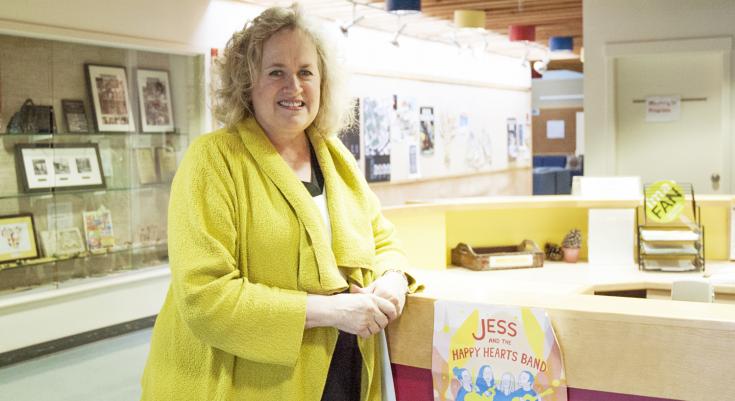
After 28 years as Director of UBC Child Care, Darcelle Cottons is retiring at the end of this year. She looks back on the university’s five decades of pioneering work, and ahead to new innovations such as modular and $10-a-day childcare
“Hi Corey!” says Darcelle Cottons with a wave. The Director of UBC Child Care is checking in with six educators taking a group of boisterous kids outside to play. The April morning is sunny but chilly, so the children need help with coats and hats.
“Here we have eight toddlers, and sixteen three- and four-year-olds,” Cottons explains. “It’s a split program, so siblings can be together. We have a variety of great outside space, which is so important for children’s development.”
Back in the sudden quiet of the daycare, Cottons points out the compact kitchen and diaper-changing station, designed by a UBC student. They have low trough sinks and built-in steps for small people.
The wooden furniture and bright décor are calming and peaceful. A bathroom is wedged into one corner. Next door is a nap room, where coloured mattresses lie on the floor.
“It’s a wonderful, respectful environment for kids,” Cottons says with a smile.
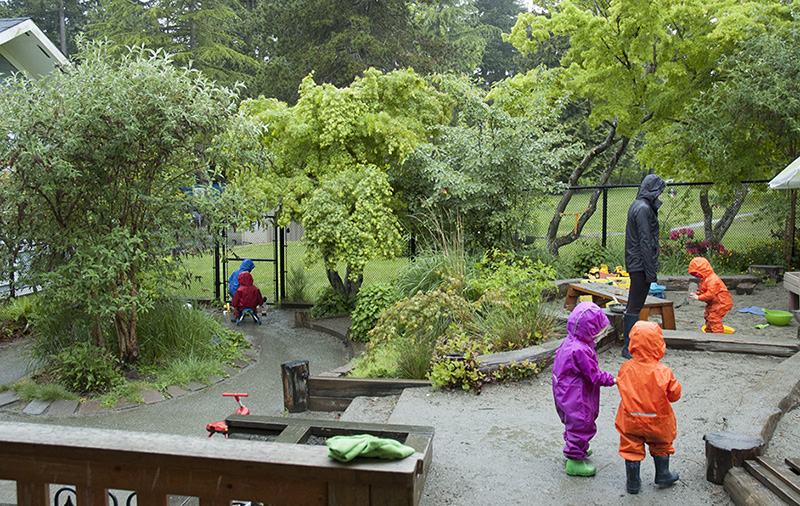
A group of toddlers step outside to play at the UBC Child Care Centre on Acadia Road.
Half a century of UBC Child Care
Back in her office on Acadia Road, Cottons reflects on her 28 years as Director of UBC Child Care. She has worked in childcare since the early 1970s, when birth control and work opportunities were transforming women’s lives and society’s attitude to childrearing. Born in Trail, she studied early childhood education at Mount Royal and UBC, then moved back to the Kootenays to raise three children before returning to Vancouver in 1986.
“Organized, licensed child care grew out of a wonderful opportunity,” Cottons says, “but sadly, in western Canada, it hasn’t been fully supported — in fact, it’s been starved by successive governments.” There is still a long way to go to meet the current demand.
UBC Child Care turns fifty this year; the first program was set up by parents on campus in 1969. When Cottons became Director on July 1, 1991, it had just been restructured to be part of UBC within the Student Housing Portfolio. “That turned out to be a good decision,” she says.
“We’re in the same business: supporting students away from home.”
The following year the university came up with a framework for funding child care that has survived unchanged: parent fees and government grants pay staff salaries and other overhead, such as food and learning equipment; the university pays the rest, including rent and utilities.
When Cottons started, the child care buildings were “brand spanking new, state of-the-art,” she says. She thought her job was going to be easy. “Then I saw the old toys, and the playgrounds, which were mud pits! I thought, ‘Oh yes, they do need me!’”
Back then UBC had 220 child care spaces and 32 staff, making it the largest on-campus childcare service in North America. It still is, though it’s more than tripled in size.
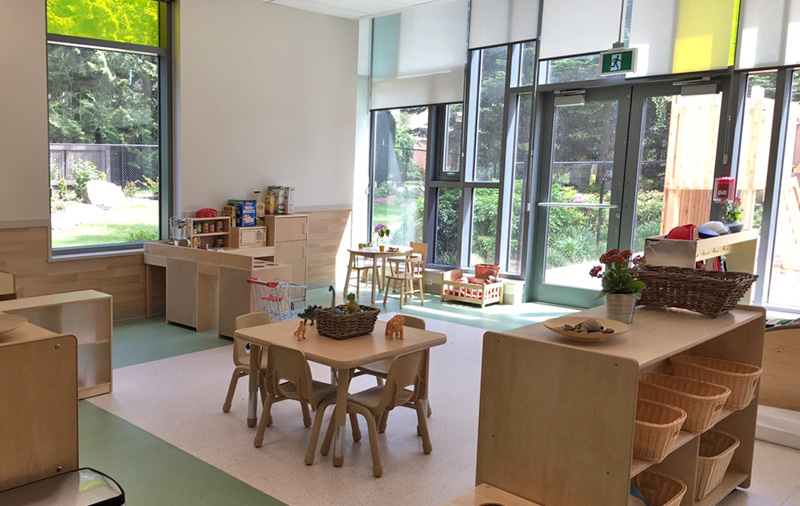
Inside the Vista Point YWCA Child Care Centre on Thunderbird Ave.
“Darcelle’s biggest achievement was transforming eight separate parent co-ops into a large, professional team,” says Deb Thompson, Manager of Children's Programs, Student Housing and Hospitality Services. “She has consistently focused on leadership and ethics. Every centre has been encouraged to keep its own identity, with a strong, responsible, visionary leader in each one.”
“We’re still run by the institution, not contracted out,” says Cottons. “That the university owns us is a point of pride!” UBC is working hard to support the delivery of quality child care. “The AMS also supports child care,” Cottons explains. The student society contributed almost a million dollars — one quarter of the total funding — in 2009, in exchange for 40% of the total spaces. The rest were reserved for faculty and staff.
UBC and the University Neighbourhood Association (UNA) deliver a range of infant, toddler, preschool, and school age programs. UBC also offers occasional child care for flexible short-term care.
“UBC places a great importance on providing high quality child care and ensuring these services are available on campus for families who live, study and/or work here,” said Andrew Parr, Managing Director of Student Housing and Hospitality Services. “We are committed to providing child care on both academic and neighbourhood lands to support the recruitment and retention of outstanding student, faculty, staff and researchers. Without child care we know some of these amazing people would not have come to UBC…it’s a critical recruitment and retention tool.”
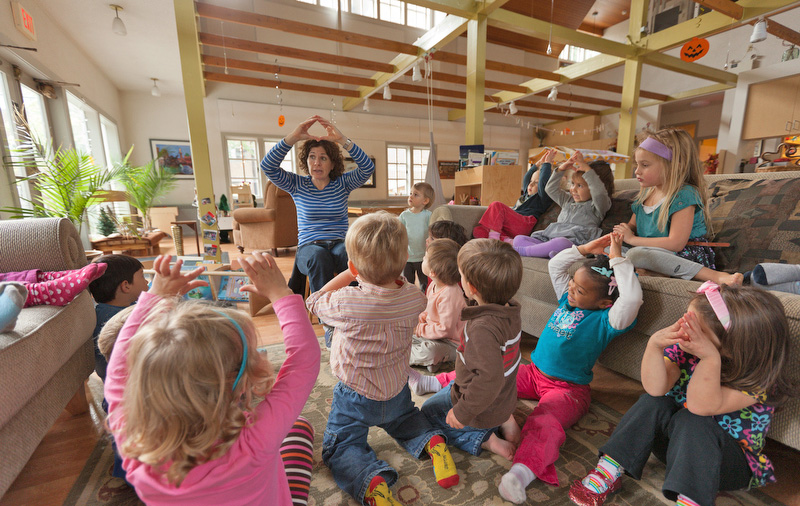
Children at UBC Owl Child Care participate in a sing-along.
Growing to Meet the Need
To meet the growing demand, the supply of child care spaces at UBC has progressively increased over the last 40 years. UBC’s Child Care Expansion Plan was updated in April 2018 and provides a framework to address long-range needs for child care as the campus population grows.
In the last decade, the university has expanded its child care spaces regularly, adding a new program every couple of years. It now operates 814 licensed child care spaces from 28 different centres, plus an occasional child care centre for flexible short-term care. And UBC Student Housing and Hospitality Services now integrates child care into many of its new student housing developments.
The Child Care Expansion Plan aims to create an inventory of up to 1,200 spaces by 2041, with a focus on delivering more child care spaces for children under 3 years of age. This reflects a sustainable approach to child care expansion to ensure that the pace of growth maintains UBC’s quality of service and optimizes the available funding to build and operate child care at UBC.
Since the Child Care Expansion Plan was updated, the UNA has opened a 24-space school age care program in the Old Barn Community Centre as well as a 15-space school age program in the Wesbrook Community Centre. Both programs are operated by the YMCA. In addition, three new modular buildings in Acadia Park and the new Wesbrook Child Care Centre are in development. These projects will add up to 149 spaces to the child care and school age care inventory.
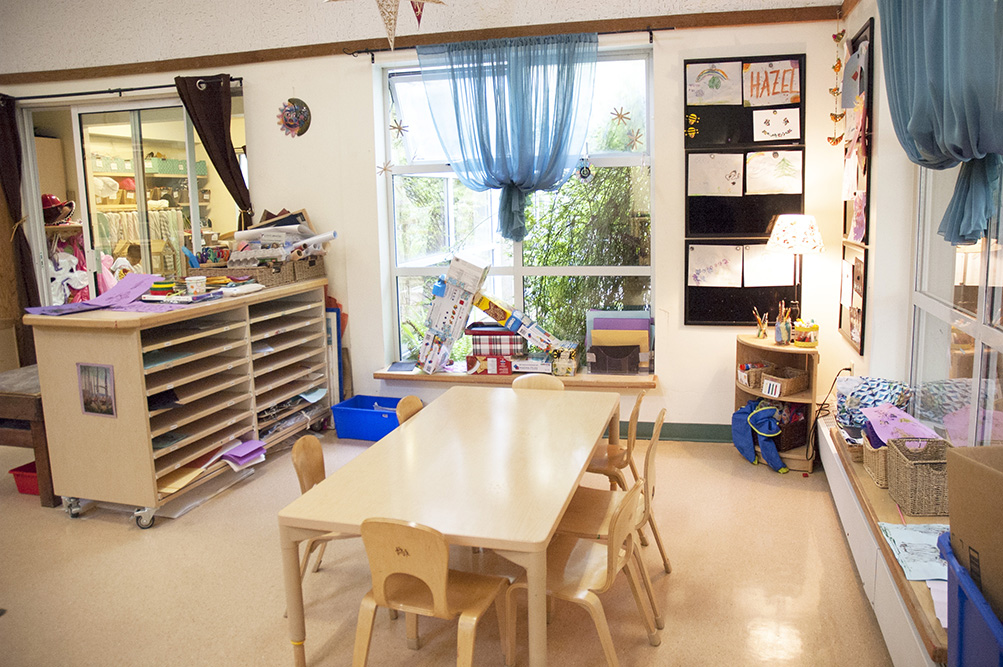
Inside one of the child care spaces at the UBC Child Care Centre on Acadia Road.
Two New Innovations: Modular and $10-a-Day Child Care
To address demand, earlier this year, UBC approved the addition of three new modular child care buildings, which will add 100 spaces. “They are designed so they can convert from one age group to another,” explains Cottons, “which makes it more flexible, but no cheaper. The provincial government is interested in the idea of expanding into government-owned lands like schools and parks, so they’re supporting the program.” The new centres will be located in Acadia Park and are expected to open late summer.
UBC is also one of several groups prototyping $10 a day child care, with a 24-space pilot program run thanks to a grant from the provincial government. If it’s successful, Cottons hopes it will encourage BC to roll out a province-wide program.
“Attitudes have changed,” Cottons says. “This is a chance to show that good child care strengthens the whole community. It’s not just an issue for women or low-income families. When you subsidise it across society and make it a public good, everyone benefits.”
Putting Passion into Practice
To run all the pilot projects and mixed-age programs, the department needs space and highly qualified staff. “We exceed the regulations in every way we can afford,” Cotton says.
“Our child care staff are among the best compensated in the province.”
Thompson notes that UBC Child Care has an excellent reputation for its contributions to early childhood education over many decades. “Darcelle has created a climate where people can put their passions into practice. She has consistently focused on leadership and ethics.”
Parr acknowledged Cotton’s significant contribution adding “I am thankful for Darcelle’s leadership in the field of early childhood education at UBC and the amazing difference she and her team have made to literally thousands of families studying, teaching and doing research at UBC.”
“Child care is a great leveler,” adds Cottons. “It’s always somebody’s child — the parent could be a brilliant professor or a gardener, we all want the same things for our kids, they all have the same needs. It’s a great way to build community.”